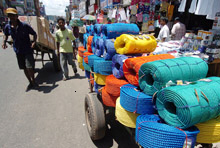
Typical street scene in Santa Ana, El Salvador. (Photo: iStock)
IMF Survey: IMF to Lend $2.6 Billion to Sri Lanka
July 29, 2009
- Loan to address balance of payments problems and set conditions for long-term growth
- Measures to allow for post-conflict reconstruction
- Spending on social transfers to be protected
The IMF will lend $2.6 billion to Sri Lanka to help it recover from the impact of the global financial crisis and return the South Asian country to long-term, sustainable growth after almost three decades of war.

Sri Lankan laborers in Colombo. Sri Lanka's economy was adversely affected as a result of the global financial crisis. (Photo: Lakruwan Wanniarachchi/AFP)
Global Financial Crisis
“The end of the conflict provides Sri Lanka with a unique opportunity to undertake economic reform and reconstruction, which would be key to laying the basis for high economic growth in the years ahead,” said IMF Managing Director, Dominique Strauss-Kahn. “The economic measures that the authorities are taking under the program justify the access to Fund resources.”
The loan is aimed at addressing the short-term economic needs of the country, which is facing balance of payment difficulties, while laying the foundations for long-term sustainable growth. Preventing a deeper economic slowdown is an essential part of helping protect Sri Lanka’s people.
Rebuilding foreign reserves
Sri Lanka’s recent economic and social progress has been put under strain by the slowdown in the global economy, declining export prices, and capital outflows. In recent years, the government has relied on short-term financing from international markets to finance budget deficits. The global economic shock halted this channel of financing and led to capital outflows, resulting in a significant drop in Sri Lanka’s international reserves.
Up until last September, Sri Lanka had around three months of foreign reserves. The financial crisis depleted most of these reserves, which remain at low levels.
Sri Lanka’s exports, mostly tea and garments, face a projected 13 percent drop in 2009, after averaging about 8 percent growth over the last several years.
The IMF program, which is expected to run through 2010, will help rebuild the country’s reserves to pre-crisis levels, as well as bringing down the budget deficit to sustainable levels—with a target of 7 percent this year and 5 percent by 2011—and strengthening the financial sector.
Measures to strengthen the financial sector to make it more robust to future shocks include improving financial sector regulation, addressing gaps in the supervisory framework, and putting in place a framework to allow for the orderly restructuring of troubled banks.
The peace dividend
The end of the country’s 26-year civil war earlier this year will provide Sri Lanka with significant growth opportunities by boosting investor confidence and opening up regions previously affected by the conflict for economic development.
“To this end, the government has formulated a program aimed at restoring fiscal and external viability and addressing the significant reconstruction needs of the conflict-affected areas,” he added.
Hundreds of thousands of people have been displaced by the nearly three-decade long conflict and the amount of funding needed for reconstruction is likely to be significant for many years to come.
“It is also essential that the program cushion the most vulnerable from the needed adjustment,“ said Strauss-Kahn.
The government’s program of economic reform also envisages protecting spending on social transfers to the country’s most vulnerable. One of the first priorities of the government will be to provide resources for basic human services for the internally displaced persons. Under the program, social spending on health, education, and poverty alleviation amounts to 7 percent of GDP.
The IMF loan will also act as a catalyst for other international donors to assist with the reconstruction effort. The Fund’s Managing Director called on the Sri Lankan authorities to work with the donor community to ensure an adequate level of financing for the reconstruction effort to lay the foundation for future growth.
With the IMF Executive Board’s approval of the loan, which is being extended as a 20-month Stand-by Arrangement, Sri Lanka is entitled to draw on about $322 million immediately.
Comments on this article should be sent to imfsurvey@imf.org


